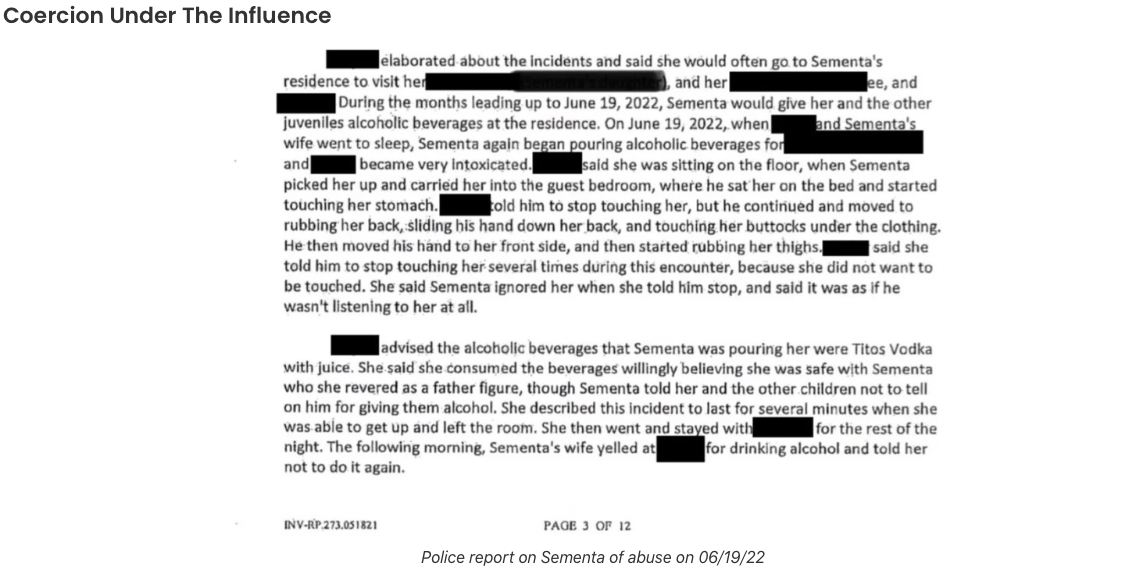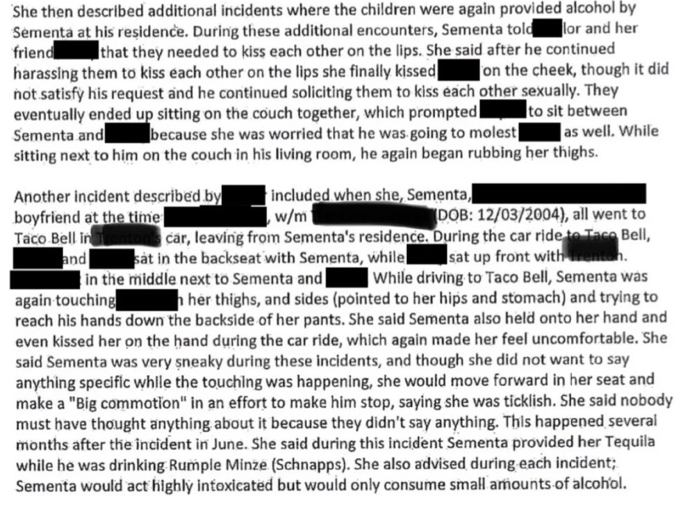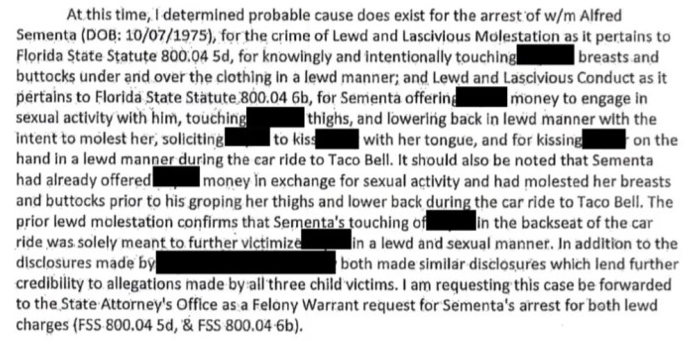Ministerial Servant Charged with Abuse in Florida
In Florida on June 26, 2024, Alfred R. Sementa, a Jehovah’s Witness and Ministerial Servant in his congregation, was charged and arrested for two counts of lewd and lascivious molestation under Florida State Statute 800.04.5d, and lewd and lascivious conduct under Florida State Statute 800.04.6b. Despite the charges and arrest, the family, who are active Jehovah’s Witnesses, believe him to be innocent. The congregation he attended disfellowshipped him not for the abuse, but for excessive drinking.
Three victims, all Jehovah’s Witnesses, were under the age of 18—13, 14, and 15 years old when the assaults and molestations occurred.
Florida Statute 800.04(5) defines lewd or lascivious molestation as intentionally touching a person under 16 years of age in a lewd or lascivious manner, or forcing or enticing them to touch the perpetrator. This includes touching the breasts, genitals, genital area, buttocks, or clothing covering those areas.
Florida Statute 800.04(6) is part of Title XLVI of the Florida Statutes, which covers crimes. It defines lewd or lascivious conduct as intentionally touching someone under 16 years of age in a lewd or lascivious manner or soliciting someone under 16 to commit a lewd or lascivious act.
The police report regarding Sementa has pages of the assaults from the victims, expressing that they had all confided and trusted in Sementa because he was trusted in the congregation and viewed as a father figure to them.
All three victims have similar stories of the abuse. This is a common instance where an abuser uses the same tactics on their victims to lure them in.
Sementa often gave the victims who came forth alcoholic beverages, and if they refused, he would verbally abuse them until they complied.
One of the victims recounted that in February 2023, Sementa provided them with alcohol at an assembly, disguising the drinks in Coke and Sprite cans to avoid detection. On many occasions to all of the victims, Sementa was excessively touchy, frequently hugging them, and once even coerced victims to make out with each other, harassing them until they obeyed. Sementa also offered money to one victim in exchange for sexual activity and, at one point, tried to force her to pretend to be another girl for sexual pleasure.
The molestation of one victim began in 2022, but she was too anxious and fearful to come forward. She worried no one would believe her because “Sementa was so well-liked within the religious community and his family.”
This type of abuse happens more often than people realize. How could one man manage to engage in such lewd conduct, especially someone perceived as a respected member, a ministerial servant in the congregation?
Religious Manipulation: Using religious texts, beliefs, or practices to control or manipulate someone’s behavior or decisions.
Spiritual Coercion: Forcing someone to conform to certain religious practices or beliefs under threat of spiritual consequences or social ostracism.
Authoritarianism: Exercising excessive control or authority over others within a religious context, often demanding unquestioning obedience.
Cult-like Practices: Implementing practices commonly associated with cults, such as isolation from outside influences, excessive devotion to a leader, or strict control over members’ lives.
Moral Intimidation: Using guilt, fear, or shame to influence or control someone’s actions or beliefs.
Grooming
During one occasion in Sementa’s home, a victim speaks about Sementa asking intrusive questions, such as if she has ever had sex or had an orgasm before- asking her 8 times in one day, whispering because his wife was home. He also asked if she ever performed oral sex and offered himself as practice.
On 2 different occasions, one happening during a family funeral, Semeta offered a victim money to perform sexual activities. He then got her drunk and forced her to perform multiple sexual acts on him. She opened up about feeling like he was grooming her at this time.
Sementa was very cunning in how he assaulted the victims. For example, as a group of witnesses drove to a fast food restaurant with her and him in the back seat, he was becoming so touchy that she made a big commotion to attract attention as he was molesting and fondling her. One of the victims recalls a time when she stayed at Sementa’s household and woke up from a nightmare. When she told Sementa that the nightmare was about being raped, he responded, “You might like it”
These figures often occupy positions of trust and respect within the community to groom young ones. They might:
Show Special Attention: Give children special attention and privileges to make them feel valued and unique.
Build Dependency: Create an emotional dependency by acting as a confidant and advisor, making children feel reliant on them for guidance and support.
Normalizing Inappropriate Behavior
To break down the child’s natural defenses and normalize inappropriate behavior, they might:
Introduce Gradual Boundaries Shifting: Start with seemingly innocent actions that gradually become more inappropriate, making it harder for the child to recognize the behavior as wrong.
Confuse Moral Boundaries: Use religious teachings or interpretations to justify inappropriate actions, creating confusion about what is acceptable behavior.
Isolating the Child
Isolating the child from others can prevent them from seeking help or realizing the behavior is wrong:
Create a Sense of Exclusivity: Making the child feel special and chosen can isolate them from peers and family members.
Discourage Outside Relationships: Discourage relationships with those outside the religious group, portraying them as harmful or sinful.
Manipulating Emotions
Emotional manipulation is used to maintain control over the child and ensure their compliance:
Instill Fear and Guilt: Use fear of divine retribution or guilt about disobedience to keep the child silent and compliant.
Play on Loyalty and Obedience: Emphasize the importance of loyalty to the religious group and obedience to its leaders, making the child feel obligated to comply.
Silencing and Blaming
If the child begins to question or resist, authoritative figures may use tactics to silence them:
Victim Blaming: Suggest that the child is at fault for any inappropriate behavior, making them less likely to report it.
Gaslighting: Make the child doubt their perceptions and memories of events, leading them to question their reality.
By combining these tactics, religious authoritative figures can groom children, making it difficult for them to recognize the abuse and seek help.
Gaslighting
Gaslighting is a tactic often used by men in positions of superiority over women and children to make their actions seem irrelevant, less damaging, or to shift blame onto the victim.
In Sementa’s police report, there was no expression of remorse or confession. Instead, Sementa portrayed one of the victims as a troubled kid, highlighting their struggles with depression and anxiety, and even mentioned a previous incident where she was caught with pot. These details were irrelevant and unrelated to the assaults involving Sementa.
In Sementa’s sworn affidavit, he denied all allegations, including ever giving alcohol to minors, despite earlier confessions and witness testimonies. This denial is a common tactic used by perpetrators to evade accountability.
At the end of his affidavit, Sementa stated, “The person that filed this report is an ex-family member obsessed with dividing this family. She has a deep hatred for our religious organization and does not follow Bible standards. An apostate.” However, he did not know who had reported him, and it was not this “apostate” who had done so.
How do religious authoritative figures, such as Elders and Ministerial Servants, gaslight within the congregation?
Manipulation of Beliefs: They might twist or reinterpret religious texts to justify their actions or discredit the victim’s feelings and experiences. For example, they might claim that the victim’s doubts or concerns are signs of weak faith or sinful behavior.
Denying Experiences: When victims express discomfort or report abuse, the authority might outright deny these experiences, suggesting that the victim is mistaken or exaggerating. They might say things like, “You must be confused; that never happened.”
Creating Dependency: The manipulator fosters a sense of dependency by convincing the victim that only they can provide spiritual guidance and salvation. This creates a power imbalance where the victim feels unable to challenge or leave the authority’s influence.
Isolation: The authority may isolate the victim from friends, family, or other sources of support within or outside the religious community, making the victim more reliant on the authority and more vulnerable to manipulation.
Using Guilt and Shame:The manipulator exploits the victim’s faith, using guilt and shame to control them. They might suggest that questioning the authority is equivalent to questioning the faith or God, making the victim feel guilty for having doubts.
Despite Sementa being arrested and charged on June 26th, 2024, its been said that most of Sementa’s family, who have been Jehovah’s Witnesses since the late 1800s, fully believe in his innocence.
——————————————————————-
Abuse perpetrated by religious authoritative figures is a violation of trust that can inflict deep and lasting harm on individuals and communities, such as the Jehovah’s Witness Organization. It is essential that such abuses are brought to light and understood, not only to provide justice and healing for the victims but also to prevent future occurrences. There are many instances of elders, Ministerial servants, pioneers- anyone who seems to have higher authority or rank that repeatedly abuses ones in the congregation because it was not addressed, and they were not outed to authorities.
Raising awareness about these abuses challenges the unchecked power of these figures and fosters accountability within religious institutions. By acknowledging and addressing these issues, society can protect the integrity of spiritual leadership and ensure that religious spaces remain safe and supportive environments for all individuals.
If you or someone you know is experiencing abuse, please reach out to the police.





